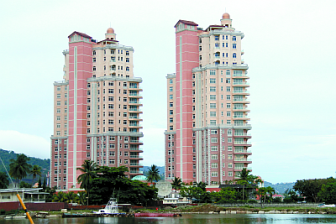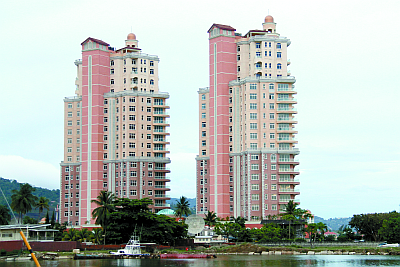(Trinidad Guardian) CIBC First Caribbean and RBC Royal Bank are threatening to appoint a receiver as they try to recover debts of TT$850 million owed to them for the construction of the luxury, high-rise apartment complex, known as the Shorelands Renaissance. The project, which is estimated to have cost TT$1.1 billion, was originally due to be completed in April 2008. It was eventually delivered — more than four years late and hundreds of millions over budget — last month. The bone of contention among the banks, the development company and the prospective homeowners is who should pay for the escalation in the cost of the project. The development company is 50 per cent owned by members of the Rahael family, and 25 per cent each by property developers Jeffrey Guillen and Richard Woodruff.
The project, which started in March 2006 faced delays and escalating costs of labour and materials in its early days as all property developers struggled with the construction boom between 2005 and 2008. As a result, by 2010 the developers needed approximately TT$425 million to complete the project, said Joseph Rahael, a director of Hyancinth Akow Ltd, the property development company. Having sold 43 of the 74 residences before and during construction, in April 2010, the developers expected to earn TT$550 million from the sale of the 31 unsold units and TT$300 million more from the prospective homeowners, who were required to make the down payments for their units in the form of share subscriptions. In order to qualify for the loan, the developers were required to pledge additional collateral in the form of property as well as get the subscribers to agree to pay enhanced escalation costs, Rahael said. “The majority of subscribers agreed to that enhanced escalation and indicated their willingness, in writing, to pay it. The problem is that a number of subscribers who had indicated their willingness to pay the enhanced escalation are now saying they are not prepared to do so,” according to Rahael.

He refused to disclose the exact number of subscribers who had agreed to pay the escalation or how many are now refusing to pay it. A representative of the subscribers, who did not want to be named because of the possibility that the matter could get litigious, said: “In the extreme, some people are being asked to pay just short of 50 per cent more than the base price they had contracted. The original escalation clause was between ten and 12 per cent.” On Friday last, the two Canadian banks issued a threatening e-mail to the subscribers, which followed a town hall meeting on June 27 at which the subscribers were asked to confirm that they would purchase their shares at the enhanced escalated subscription price. The prospective homeowners were given three weeks to sign and return the supplemental subscription agreements, on July 18, last Wednesday. The Canadian banks have refused to countenance a counter-offer of a lower escalation and a concessionary interest loan, instead writing the subscribers that they are “now preparing to exercise their rights under their security, including the appointment of a receiver” for the development company.
The e-mail also noted that the “subscriptions paid by the existing subscribers would in all likelihood be lost as any claim for repayment would be unsecured.” The complex comprises 74 residences: Eight penthouses, 28 four-bedroom units, 26 three-bedroom units and 12 two-bedroom units. Thirty-four of the residences were presold and nine were sold during the construction period.

